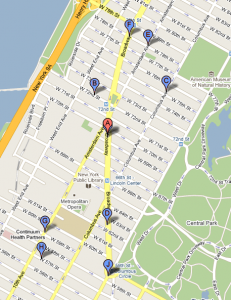Last week, Johnson & Johnson announced a recall of Children’s Tylenol. A day later, one of my children ran a fever. Luckily, we live in Manhattan, home of Duane Reade and their seemingly bazillion locations throughout the island. As you can see from the map below right, they’re everywhere. In fact, there is one in my apartment building — and twelve (!) others less than half a mile away.
 Dutifully, I went down there to get some Children’s Tylenol — or, rather, the generic equivalent. I spoke with the manager, who informed me that the name-brand product had been recalled, so they didn’t have it, and that Duane Reade does not carry a generic.
Dutifully, I went down there to get some Children’s Tylenol — or, rather, the generic equivalent. I spoke with the manager, who informed me that the name-brand product had been recalled, so they didn’t have it, and that Duane Reade does not carry a generic.
This did me no good.
I went a block away, passing another Duane Reade en route, to a CVS. They sell a CVS-branded generic equivalent, which I learned when I arrived there to see it on the shelf. Problem solved, with minor-at-worst inconvenience.
Yet a week later, the exchange with the Duane Reade manager bothered me. I could have gone anywhere for the medicine — the product is the same at CVS, Duane Reader, RiteAid, etc. — but I came to him. Yes, I came to him because he was closest, but that’s by design: Duane Reade wants to always be the closest drug store, because convenience matters. The fact that there’s almost always a Duane Reade around the corner acts as a proxy for good customer service.
They can be forgiven for not having generic children’s acetaminophen. But with a recall in effect for the name-brand product, how hard would it be for them to advise me to go to CVS? Look at it from my perspective: It’s 8 A.M. There’s a well-publicized recall in effect for the medicine I need — it hit the wires midday the day prior. He’s in charge of a drug store, and I’m there looking for medicine (clearly) for my child. Odds are, I’m going to leave his store and go to a competitor anyway. If he sends me there, I’ll remember that fondly. I’ll appreciate the great customer service. And I’ll come back next time.
Instead, I’m left wondering: Why wouldn’t he help?